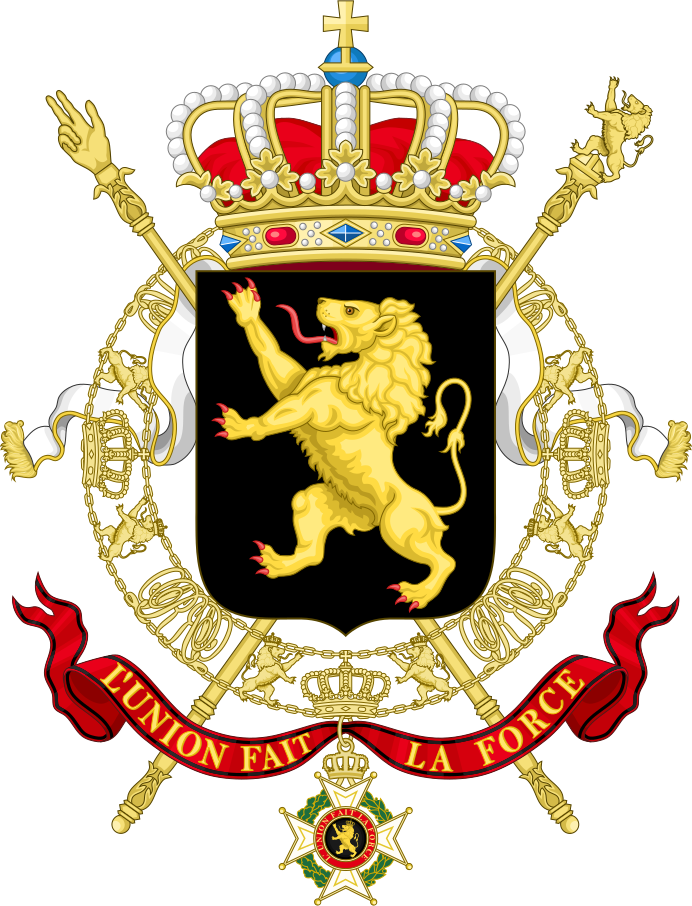
Belgium
Eendracht maakt macht
(Unity makes strength)

History
Geography
Armed forces
Religion
Education
Roman Catholicism has traditionally been Belgium's majority religion; being especially strong in Flanders. However, by 2009 Sunday church attendance was 5% for Belgium in total; 3% in Brussels, and 5.4% in Flanders. Church attendance in 2009 in Belgium was roughly half of the Sunday church attendance in 1998 (11% for the total of Belgium in 1998). Despite the drop in church attendance, Catholic identity nevertheless remains an important part of Belgium's culture.

According to the Eurobarometer 2010, 37% of Belgian citizens responded that they believe there is a God. 31% answered that they believe there is some sort of spirit or life-force. 27% answered that they do not believe there is any sort of spirit, God, or life-force. 5% did not respond. According to the Eurobarometer 2015, 60.7% of the total population of Belgium adhered to Christianity, with Roman Catholicism being the largest denomination with 52.9%. Protestants comprised 2.1% and Orthodox Christians were the 1.6% of the total. Non-religious people comprised 32.0% of the population and were divided between atheists (14.9%) and agnostics (17.1%). A further 5.2% of the population was Muslim and 2.1% were believers in other religions. The same survey held in 2012 found that Christianity was the largest religion in Belgium, accounting for 65% of Belgians.
Symbolically and materially, the Roman Catholic Church remains in a favorable position. Belgium officially recognizes three religions: Christianity (Catholic, Protestantism, Orthodox churches and Anglicanism), Islam and Judaism.
In the early 2000s, there were approximately 42,000 Jews in Belgium. The Jewish Community of Antwerp (numbering some 18,000) is one of the largest in Europe, and one of the last plac
 es in the world where Yiddish is
the primary language of a large Jewish community (mirroring
certain Orthodox and Hasidic communities in New York, New
Jersey, and Israel). In addition, most Jewish children in
Antwerp receive a Jewish education. There are several Jewish
newspapers and more than 45 active synagogues (30 of which
are in Antwerp) in the country. A 2006 inquiry in Flanders,
considered to be a more religious region than Wallonia,
showed that 55% considered themselves religious and that 36%
believed that God created the universe. On the other hand,
Wallonia has become one of Europe's most secular/least
religious regions. Most of the French-speaking region's
population does not consider religion an important part of
their lives, and as much as 45% of the population identifies
as irreligious. This is particularly the case in eastern
Wallonia and areas along the French border.
es in the world where Yiddish is
the primary language of a large Jewish community (mirroring
certain Orthodox and Hasidic communities in New York, New
Jersey, and Israel). In addition, most Jewish children in
Antwerp receive a Jewish education. There are several Jewish
newspapers and more than 45 active synagogues (30 of which
are in Antwerp) in the country. A 2006 inquiry in Flanders,
considered to be a more religious region than Wallonia,
showed that 55% considered themselves religious and that 36%
believed that God created the universe. On the other hand,
Wallonia has become one of Europe's most secular/least
religious regions. Most of the French-speaking region's
population does not consider religion an important part of
their lives, and as much as 45% of the population identifies
as irreligious. This is particularly the case in eastern
Wallonia and areas along the French border.A 2008 estimate found that approximately 6% of the Belgian population (628,751 people) is Muslim. Muslims constitute 23.6% of the population of Brussels, 4.9% of Wallonia and 5.1% of Flanders. The majority of Belgian Muslims live in the major cities, such as Antwerp, Brussels and Charleroi. The largest group of immigrants in Belgium are Moroccans, with 400,000 people. The Turks are the third largest group, and the second largest Muslim ethnic group, numbering 220,000.